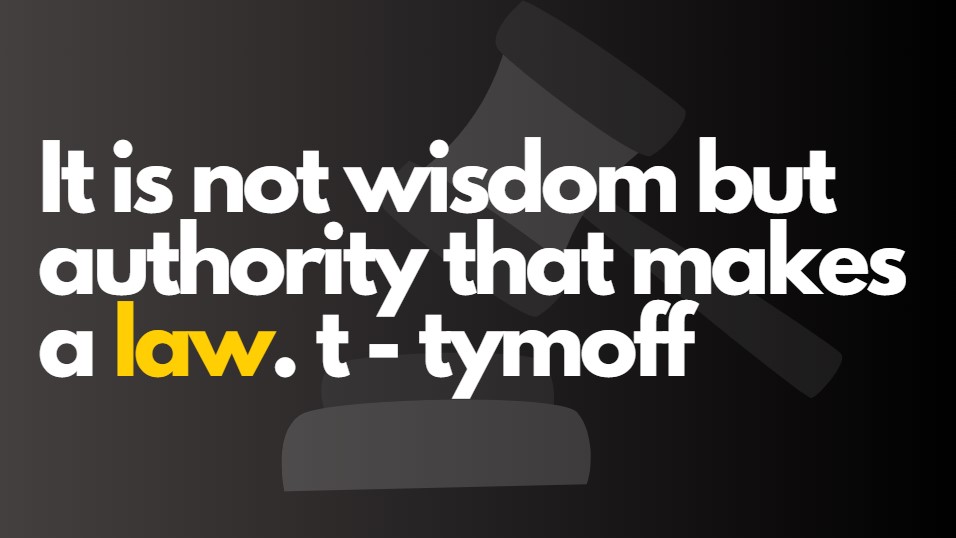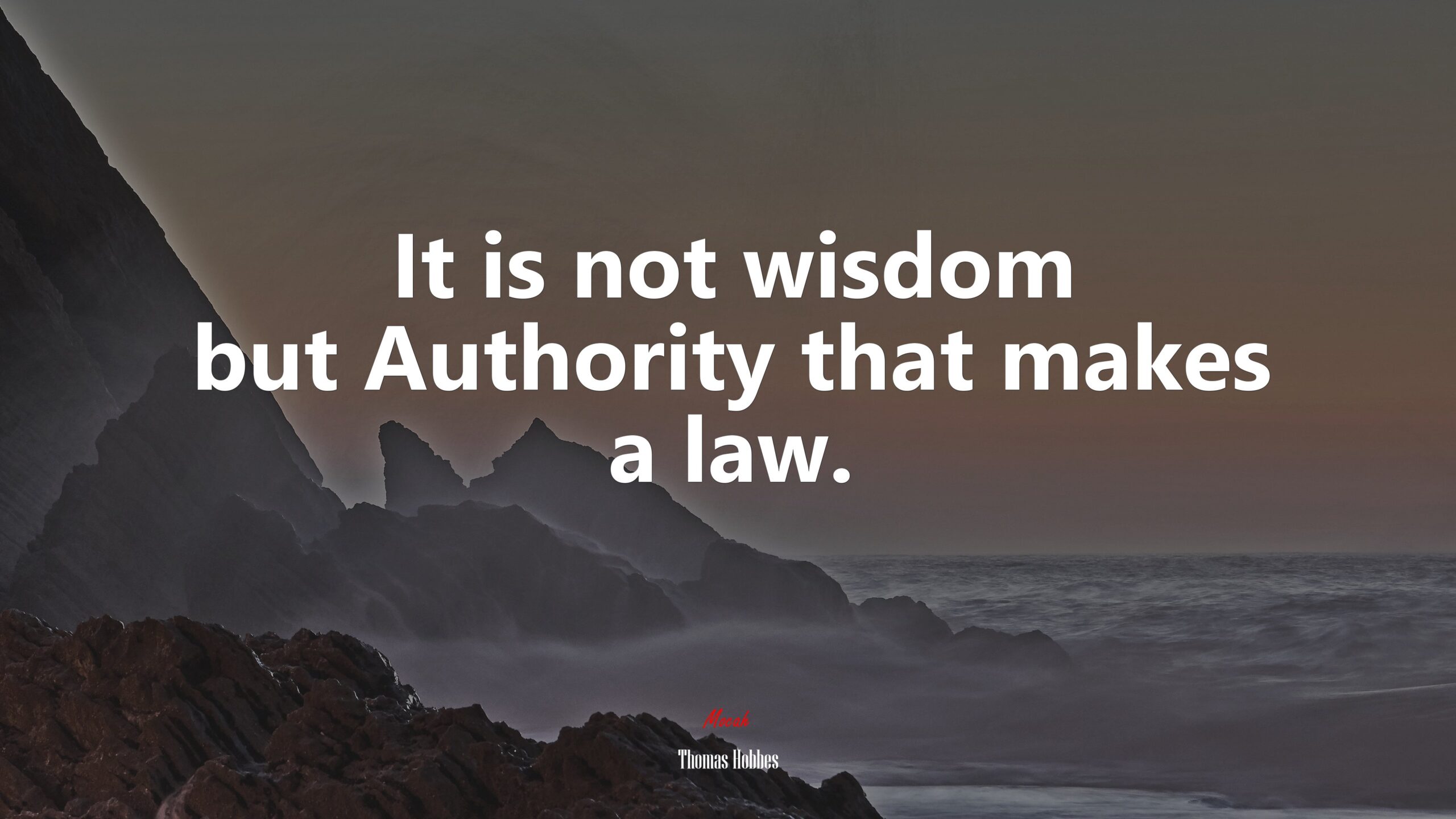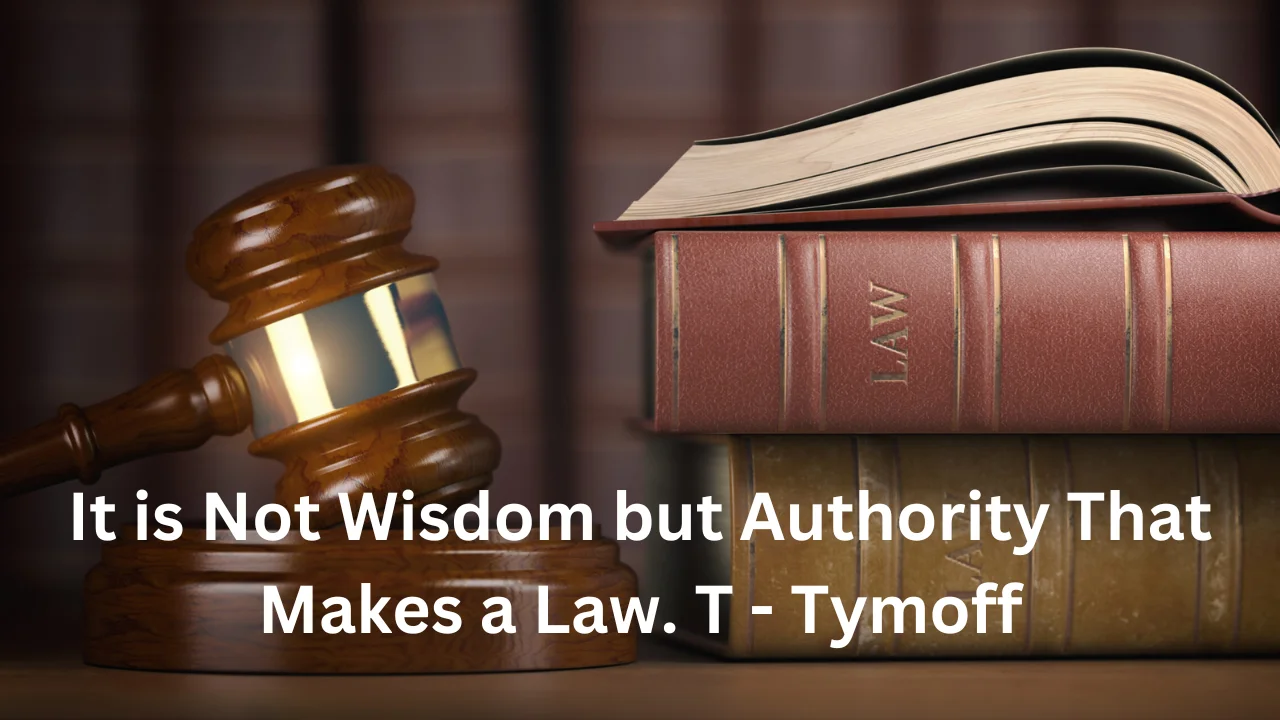It Is Not Wisdom but Authority That Makes a Law An Examination of Tymoff It Is Not Wisdom but Authority That Makes a Law An Examination of Tymoff, In the realm of jurisprudence and governance, the interplay between wisdom and authority in the making of laws has been a subject of profound philosophical inquiry and practical consideration. The statement, “It is not wisdom but authority that makes a law,”
attributed to Tymoff, encapsulates a contentious aspect of lawmaking that transcends time and borders. This assertion challenges the conventional understanding of laws as products of rational deliberation and societal consensus, raising pertinent questions about the nature of authority, the legitimacy of laws, and the role of wisdom in governance.

It Is Not Wisdom but Authority That Makes a Law An Examination of Tymoff To delve into Tymoff’s assertion is to embark on a journey through the annals of legal theory, political philosophy, and the dynamics of power. At its core lies a fundamental dichotomy between the idealized notion of wisdom as the guiding force behind legislation and the pragmatic reality of authority as the ultimate arbiter of legal validity.
Understanding Tymoff’s Assertion
Before dissecting the implications of Tymoff’s assertion, it is imperative to elucidate its context and underlying premises. Tymoff’s statement challenges the prevailing belief that laws emerge from a rational and enlightened process of deliberation wherein wisdom, defined as sound judgment and ethical discernment, serves as the cornerstone of legislative action.
It Is Not Wisdom but Authority That Makes a Law An Examination of Tymoff Instead, Tymoff posits that authority, vested in individuals or institutions with the power to dictate norms and enforce compliance, is the primary determinant of legal pronouncements. In essence, the legitimacy and enforceability of laws derive not from their inherent wisdom or moral rectitude but from the authoritative mandate that accompanies them.

The Primacy of Authority in Lawmaking
It Is Not Wisdom but Authority That Makes a Law An Examination of Tymoff assertion is the recognition of authority as the fulcrum of legal systems. In the absence of authoritative endorsement, laws lack the coercive force necessary to regulate conduct and maintain social order. Whether emanating from democratic institutions, monarchical decrees, religious edicts, or customary practices, the authority invested in legal frameworks confers upon them a binding potency that transcends mere intellectual validity.
Historically, myriad examples attest to the potency of authority in shaping legal regimes. From ancient monarchs promulgating decrees to modern legislative bodies enacting statutes, the exercise of authority remains pivotal in the codification and enforcement of laws. It Is Not Wisdom but Authority That Makes a Law An Examination of Tymoff The legitimacy of legal systems often hinges on the perceived legitimacy of the authority underpinning them, underscoring the symbiotic relationship between power and law.

Challenges to the Supremacy of Wisdom
It Is Not Wisdom but Authority That Makes a Law An Examination of Tymoff , defined by its ethical and rational dimensions, ostensibly informs the formulation of just laws, its ascendancy is frequently eclipsed by the imperatives of authority. It Is Not Wisdom but Authority That Makes a Law An Examination of Tymoff In practice, the pursuit of wisdom in lawmaking encounters formidable obstacles, including partisan interests, ideological biases, institutional constraints, and socio-cultural complexities.
Moreover, the very notion of wisdom is inherently elusive and contested, defying facile categorization or universal consensus. What constitutes wisdom in one context may be perceived as folly or injustice in another, complicating efforts to enshrine it as the preeminent criterion for legislative action.
Must Read=Goddard Veterinary Group Chalfont St Peter
The Role of Authority in Legitimizing Laws
It Is Not Wisdom but Authority That Makes a Law An Examination of Tymoff In contrast to the abstract and mutable nature of wisdom, authority provides a tangible and pragmatic foundation for legal norms. The legitimacy conferred by authoritative endorsement imbues laws with a semblance of universality and inevitability, rendering them impervious to subjective interpretations or moral objections.
However, the legitimacy of authority itself remains subject to scrutiny and contestation. In autocratic regimes, where power is concentrated in the hands of a privileged few, the legitimacy of laws derives from coercion rather than consent, inviting resistance and dissent from marginalized segments of society. Conversely, in democratic polities, the authority vested in elected representatives is contingent upon popular consent and adherence to constitutional principles, underscoring the inherent tension between authority and accountability.

Reconciling Wisdom and Authority in Lawmaking
It Is Not Wisdom but Authority That Makes a Law An Examination of Tymoff The tension between wisdom and authority in lawmaking precipitates a perennial quest for equilibrium between normative ideals and pragmatic exigencies. While wisdom represents the aspirational benchmark for just governance, authority serves as the indispensable instrument for effectuating legal prescriptions and safeguarding societal cohesion.
The reconciliation of wisdom and authority necessitates a nuanced approach that transcends reductionist dichotomies and embraces the dialectical interplay between principle and pragmatism. Rather than viewing wisdom and authority as antithetical constructs, proponents of legal reform advocate for their symbiotic integration within a holistic framework of governance.

Conclusion
Tymoff’s assertion, “It is not wisdom but authority that makes a law,” beckons us to confront the complexities and paradoxes inherent in the realm of lawmaking. While wisdom may illuminate the path towards justice and equity, it is the imprimatur of authority that confers legitimacy and enforceability upon legal pronouncements.
In navigating the labyrinthine terrain of legal theory and political practice, we are reminded of the enduring imperative to interrogate the sources and implications of authority in shaping our collective destinies. As stewards of justice and custodians of the social contract, we are called upon to transcend the facile allure of authority and cultivate a jurisprudence informed by the imperatives of wisdom, compassion, and human dignity.
Ultimately, the quest for a more just and equitable society demands a dialectical engagement with the interplay between wisdom and authority, propelling us towards a future where the law serves as a beacon of enlightenment rather than an instrument of oppression.



